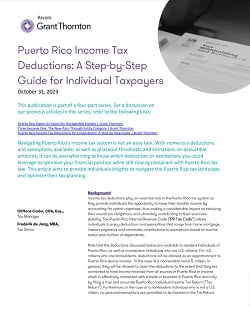
This publication is part of a four-part series. For a discussion on our previous articles in this series, refer to the following links:
Puerto Rico Opens its Doors for Disregarded Entities | Grant Thornton
Three become One: The New Pass-Through Entity Category | Grant Thornton
Puerto Rico Income Tax Deductions for Corporations: A Step-by-Step Guide | Grant Thornton
Navigating Puerto Rico's income tax system is not an easy task. With numerous deductions and exemptions available, as well as phaseout thresholds and limitations on deductible amounts, it can be overwhelming to know which deductions or exemptions you could leverage to optimize your financial position while still staying compliant with Puerto Rico tax law. This article aims to provide individuals insights to navigate the Puerto Rico tax landscape and optimize their tax planning.
Background
Income tax deductions play an essential role in the Puerto Rico tax system as they provide individuals the opportunity to lower their taxable income by accounting for certain expenses, thus making a considerable impact on reducing their overall tax obligations and ultimately contributing to their economic stability. The Puerto Rico Internal Revenue Code (“PR Tax Code”) allows individuals to enjoy deductions and exemptions that range from home mortgage, interest payments and charitable contributions to exemptions based on marital status and number of dependents.
Note that the deductions discussed below are available to resident individuals of Puerto Rico, as well as nonresident individuals who are U.S. citizens. For U.S. citizens who are nonresidents, deductions will be allowed as an apportionment to Puerto Rico source income. In the case of a nonresident non-U.S. citizen, in general, they will be allowed to claim the deductions to the extent that they are connected to total income received from all sources in Puerto Rico or income which is effectively connected with a trade or business in Puerto Rico and only by filing a true and accurate Puerto Rico Individual Income Tax Return (“Tax Return”). Furthermore, in the case of a nonresident individual who is not a U.S. citizen, no personal exemptions are permitted to be claimed in the Tax Return.
Deduction for home mortgage interest
If an individual enters into a debt loan agreement to buy or refinance their home, the interest they pay on said loan can reduce their taxable income, which potentially reduces the tax liability. The deduction applies to interest paid or accrued in the tax year on a debt loan for the purchase or refinancing of a property classified as a qualified residence, provided that the loan is guaranteed by the property. The deduction also allows interest paid or accrued during the taxable year upon debts incurred by reason of personal loans made for the acquisition or improvements of a property that constitutes a qualified residence when the residence is not accepted by the financial institution as a mortgage guarantee. For these purposes, the term “qualified residence” means:
(1) the principal residence of the individual (and their family), provided the residence may be in or outside Puerto Rico; and
(2) another residence (second home) that may be chosen for the taxable year. However, this second home must be in Puerto Rico and used by the individual, by any member of the family, or by any other person who may have an interest in the second home, as a residence during the taxable year for a number of days which exceeds the greater of:
(a) 14 days; or
(b) 10% of the number of days during the year in which the property may have been rented at the rental value prevailing in the market, unless it is used during this time as a principal residence in which case it will not be considered as another residence.
Notwithstanding, the PR Tax Code provides certain limitations on the amount that can be claimed as a home mortgage interest deduction. For these purposes, the maximum deductible amount is $35,000 per year or 30% of the individual’s (including their spouse if filing jointly) adjusted gross income modified for certain exclusions and payments. For an individual over the age of 65 at the end of the tax year (or their spouse if filing jointly), this limitation is eliminated, giving them more flexibility to claim the deduction.
For taxable years beginning after December 31, 2016, an individual may claim the home mortgage interest deduction even though they are not a debtor or co-debtor of the loan entirely guaranteed with a mortgage if certain requirements are met.
Deduction for charitable and other contributions
Individuals can lower their taxable income by making charitable contributions or gifts during the taxable year to or for the use of eligible not-for-profit organizations. Generally, these deductions are allowed for contributions or gifts actually paid during the year, regardless of when they were promised, or the accounting method used by the individual for keeping their books and records and cannot exceed 50% of the individual's adjusted gross income for the taxable year. For individuals under a “married filing jointly” filing status, the limit will be determined using the combined adjusted gross income for the taxable year.
The deduction is generally allowed for contributions made for the use of:
(1) the Government of Puerto Rico, the Government of the United States of America (“U.S. A.”), any State, territory, or any political subdivision thereof or the District of Columbia, or any possession of the U.S. A., for exclusively public purposes;
(2) churches, conventions or association of churches, as well as religious or apostolic organizations, including corporations and any community chest, fund, or foundation, organized and operated exclusively for religious purposes;
(3) organizations that provide community service to residents of Puerto Rico, duly qualified by the Puerto Rico Department of Treasury;
(4) accredited educational institutions of university level established in Puerto Rico;
(5) the José Jaime Pierluisi Foundation;
(6) the National Fund for the Financing of the Cultural Affairs;
(7) the Community Foundation of Puerto Rico;
(8) posts or organizations of war veterans, or auxiliary units or societies of any such posts or organizations, if such posts, organizations, units or societies are organized in Puerto Rico, the U.S. or any of its States or possessions;
(9) the Puerto Rico Symphonic Orchestra Corporation; and
(10) the Curable Catastrophic Illnesses Services Fund.
The PR Tax Code only allows a deduction equal to the amount contributed, which cannot exceed 50% of the taxpayer's adjusted gross income for the taxable year. The PR Tax Code also allows contributions or gifts to conservation easements to agencies of the Government of Puerto Rico or nonprofit organizations, or contributions to private or public museum institutions consisting of artwork duly valued or any other object of recognized museum value. However, if the market value of the contributed property exceeds its adjusted basis in the hands of the donor by more than 25%, the allowed deduction is the fair market value of the contributed property, up to 30% of the taxpayer's adjusted gross income for the taxable year, or 50% if the museum institution receiving the donation of the artwork is a museum duly accredited by the “American Association of Museums”, and it is located in Puerto Rico. Any excess not claimed as a deduction in the year of the contribution may be carried over to the following 5 taxable years, subject to the limitations discussed herein.
Note that there are special rules related to contributions and gifts to private museum institutions not discussed herein, as well as contributions for the celebration of the quincentennial of the establishment of Puerto Rico municipalities.
Deduction for medical expenses
Individuals may deduct medical expenses paid during the taxable year, provided that these expenses were not reimbursed by insurance or any other means, leading to significant tax savings, especially for individuals with high medical care expenses. The deduction is limited to amounts exceeding 6% of the individual’s adjusted gross income. Eligible expenses include, but are not limited to:
(1) professional services from doctors, dentists, radiologists, pathologists, minor surgeons, nurses, or hospitals, whether located in or outside of Puerto Rico;
(2) health or accident insurance premiums;
(3) prescription drugs designed for human consumption used in the diagnosis, cure, mitigation, treatment, or prevention of disease. The prescription drugs must be acquired solely and exclusively through medical prescription, if such medicines are prescribed by a physician authorized to practice medicine in Puerto Rico and are dispensed by a licensed pharmacist in Puerto Rico; and
(4) expenses incurred in purchasing equipment for technological assistance of disabled persons and special treatments or chronic illness.
The term “equipment for technological assistance” means any object, part of equipment or system, purchased or provided by the government, whether original, modified or adapted, that is used to maintain, increase or improve the capabilities of a disabled person. Some examples are wheelchairs, motorized wheelchairs, motorized equipment that is used for mobility, adapted computers, electronic communication equipment, adapted computer program, mechanical reading equipment, hearing aids, among others.
Deduction for student loan interest
To ease the financial burden of higher education expenses on taxpayers, the PR Tax Code allows individuals to deduct in the Tax Return, interest paid or accrued during the taxable year on student loans acquired to cover expenses related to university-level education. The deduction applies to loans acquired by the taxpayer, its spouse or dependents, to cover registration, tuition and textbooks expenses, as well as expenses for transportation, meals and lodging in cases where the student has to live away from home to pursue the studies.
Deduction for contributions to individual retirement accounts (IRAs)
When looking to reduce the tax burden on the Tax Return, while simultaneously securing financial stability in their retirement years, individuals may claim a deduction for IRA cash, check, money order or electronic transfer contributions. Although this deduction does not apply to the year in which the individual (or their spouse) reaches the age of 75 years:
(1) individual filers may claim a deduction up to $5,000 or their adjusted gross income for the year, whichever is lower.
(2) married taxpayers filing jointly may claim a deduction up to $10,000 per year, provided each spouse’s deduction does not exceed the $5,000 limit set forth above or their combined adjusted gross income derived from salaries or professions, whichever is lower.
For taxpayers who participate in a qualified 401(k) plan and make contributions to an IRA, the IRA contributions will count towards the annual contribution limit of $15,000 ($16,500 for taxpayers aged 50 or older).
IRA contributions made on or before the last day required for filing the Tax Return for the taxable year, including any extensions granted, are considered made on the last day of the taxable year for which the Tax Return is been filed.
Deduction for contributions to education savings accounts (ESAs)
Individuals may deduct cash contributions to a My Future Account and/or ESA, up to $500 per beneficiary, per account.If more than one relative contributes to the account, the deduction will be claimed by the relative who deposits the cash in the account. For these purposes, the financial institution receiving the contributions will issue certifications corresponding to the contributions made in the order in which the contributions are registered in the account, until the account receives the allowed $500 for the year.
However, no deduction is allowed for contributions during a year in which the beneficiary turns 26 years old. Moreover, contributions made on or before the last day required for filing the Tax Return for the taxable year, including any extensions granted, are considered made on the last day of the taxable year for which the Tax Return is been filed.
Although the deductible amount has not been adjusted in the last couple of years and may not be considered “a significant amount” based on the cost of education nowadays, this deduction may still play a crucial role in low or medium income households as a financial incentive to invest in the education of their dependents or relatives, providing both immediate tax benefits and long-term educational benefits, as well as offering relief in funding education for a child or a qualifying relative (a child or relative up to the 3rd degree of consanguinity or 2nd degree of affinity). Furthermore, there is no limitation regarding the number of ESAs to which each individualmay contribute, provided that each beneficiary of the accounts is disclosed in the Tax Return.
Deduction for loss of primary home
While this is a deduction that many individuals may not want to claim because it means suffering an unexpected loss on an important part of their personal life, the PR Tax Code allows a deduction for losses suffered during the taxable year by individuals, with respect to their primary home due to fire, storms or other casualties. The deduction may only be for amounts not covered or reimbursed by insurance or otherwise.
For spouses that live together but choose to file separate Tax Returns, each spouse may claim 50% of the deductible amount.
Deduction for loss of personal property due to casualty losses
This is also a deduction that many may not want to claim due to its correlation with personal unexpected loss. Nevertheless, the PR Tax Code allows a deduction for losses suffered with respect to automobiles, furniture, household goods and other chattels, excluding the value of jewelry or cash, not compensated for by insurance or otherwise. The losses must be the result of damage sustained during the taxable year on account of earthquakes, hurricanes, storms, tropical depressions, and floods occurring because of such casualties in an area subsequently designated by the Governor of Puerto Rico as areas whose residents are eligible for assistance under the Puerto Rico government’s disaster assistance programs.
The deductible amount is limited to $5,000, or $2,500 per spouse, for married individuals living together but opting to file separate Tax Returns. The amount of the loss not used in the year it is sustained is a casualty loss to be carried over to any of the following 2 taxable years, subject to the annual limits.
Deduction for other losses
Losses related to a trade or business may be deducted from the net income of the trade or business. For losses arising from transactions entered for profit, but not connected with the trade or business, the deduction is limited to the extent of the income generated by such profit-oriented transaction. This deduction can offer financial relief for those who encounter losses in trade, business, or profit-driven transactions, allowing them to offset these losses against their respective incomes.
Deductions for sole proprietors
Individuals with businesses may also qualify for the various deductions discussed in our mailbag, “Puerto Rico Income Tax Deductions for Corporations: A Step-by-Step Guide”. These deductions include operating expenses such as: employee wages, rent, utilities, advertising, and professional services, which can reduce taxable income if certain rules are met. These business-related deductions involve a meticulous understanding of both ordinary and necessary expenses incurred in the operation of the business and their eligibility for deduction under Puerto Rico tax laws. In addition, to ensure compliance and optimize available tax savings opportunities, individuals should be aware of the strict requirements and rules governing the application of such deductions, in particular the alternate basic tax (“ABT”) and general tax rules.
In the case of business expenses from pass-through entities, care should be exercised, since any nondeductible expense will increase the entity’s flowthrough income and will affect the individual’s tax liability and their ABT.
Exemptions
Unlike a deduction, an exemption is a specified amount that can be deducted from an individual’s adjusted gross income, thereby reducing their taxable income, and the amount of income tax they may owe.
Personal exemptions
(1) unmarried individuals, married individuals living apart, married individuals with a complete separation of property due to prenuptial agreements, or choosing to file separate Tax Returns, are entitled to a personal exemption of $3,500.
(2) married individuals living together and filing a joint Tax Return, the exemption increases to $7,000 ($3,500 each).
(3) veterans are allowed an additional personal exemption of $1,500, and if both spouses are veterans, this amounts to an additional $3,000 ($1,500 each).
Dependents exemptions
Individuals are entitled to claim a deduction of $2,500 for each dependent claimed in the Tax Return, subject to conditions that apply to relatives who are married or whose income exceeds the exemption amount. Dependents are individuals under the age of 21 (special rules apply to post-secondary students under the age of 26), the taxpayer’s parents, persons over the age of 65, and persons who are physically or mentally unable to support themselves or who are blind.
In the case of underage dependents, if the underage dependent’s parents are divorced or separated and share custody, there are rules that determine which parent is entitled to the exemption, and usually the exemption is shared equally unless one parent waives their claim.
Conclusion
Effective tax planning is essential for individuals, as it provides them with the opportunity to identify and use legitimate strategies to reduce their liabilities. A comprehensive understanding of relevant Puerto Rico taxes, deductions, credits, and exemptions allows taxpayers to improve their financial situation by reducing their tax obligations. By decreasing their tax obligations, taxpayers can allocate resources more effectively and as a result meet their financial goals efficiently. The constantly changing laws and regulations surrounding taxation require close attention from taxpayers who need to stay up to date with periodic amendments if they want to remain compliant and avoid fines resulting from discrepancies in their Tax Returns. Strategic tax planning helps ensure an individual’s money works within prevailing legislation, aiding accurate compliance while mitigating consequences should anything go wrong along the way. Tax planning is essential for anyone hoping to achieve long-term financial security and success.
As the year ends, it’s wise for taxpayers to consult with their tax advisors to anticipate obligations ahead of time, check filing requirements, and get assistance in making sure they are following applicable laws and regulations when filing their upcoming Tax Returns.
We are committed to keeping you up to date with all tax-related developments. Please contact our Tax Department, should additional information be required regarding this or any other tax issue. We will gladly assist you!
DISCLAIMER: This update and its content do not constitute advice. Clients should not act solely on the basis of the material contained in this publication. It is intended for information purposes only and should not be regarded as specific advice. In addition, advice from proper consultant should be obtained prior to taking action on any issue dealt with this update. Information provided in this publication may change in the future and such change may be applied retroactively. Kevane Grant Thornton LLP does not assume the responsibility to update this communication if the applicable laws change.
© 2023 Kevane Grant Thornton LLP All rights reserved. Kevane Grant Thornton LLP is a member firm of Grant Thornton International Ltd (GTIL). GTIL and the member firms are not a worldwide partnership. Services are delivered by the member firms. GTIL and its member firms are not agents of, and do not obligate, one another and are not liable for one another’s acts or omissions. Please visit www.grantthornton.pr for further details



